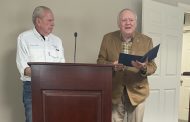By Megan Miller and Scott Buttram
MONTGOMERY –A few state media outlets have been relentless in calling for an extension of Alabama’s historic tax credits over the last several days. The credits, put in place in 2013, give tax breaks to developers restoring historic buildings.
The credits are set to expire this year, barring a last minute extension by the state legislature, which seems unlikely.
Senator Del Marsh has taken the brunt of the heat from what appears to be an organized effort among some in the media to push for the tax credit extension. In response, the senator listed several reasons for caution before renewing or extending the credits.
One of Marsh’s primary concerns is allowing the free market to work on its own and he questioned the value of some historic properties without the tax credits.
Marsh questioned whether developers receiving tax credits were getting an unfair advantage over other developers. He also expressed concern for inflated property values of historic property and wondered if the tax credits had created a cottage industry.
“I think these prices are inflated because of these tax credits, and in essence the free market should dictate what the property should really sell for, but the tax credits are destroying the free market,” said Marsh.
Some of the projects that qualify for the 25 percent state credit also qualify for a federal credit of 20 percent, giving the developer a project subsidized by taxpayers to the tune of 45 percent.
Additionally, Marsh said some of the qualifying developers have sold their tax credits to other developers.
The Alabama Department of Revenue confirmed that 60 percent of those who have filed claims for the credit are selling them.
“In my opinion, what’s happening is this is a cottage industry that’s been created through these tax credits,” Marsh said.
When the tax credits are used, there is also concern that it may hurt an already ailing general fund. At this time, Marsh estimates the state Medicaid budget has a $100 million shortfall, with costs rising each year.
“Historically, Medicaid has increased every year, and we’ve tried to get Medicaid under control and we’ll continue to try to get it under control,” said Marsh.
If the general fund faces an annual shortfall due to rising Medicaid costs, any tax credits claimed will deepen the financial hole for the state.
Marsh has had his own personal experience with historical tax credits. Marsh and his wife restored the Victoria Inn in Anniston, and chose not to take any state or federal tax credits for their restoration efforts.
Marsh approached the City of Anniston, promising to spend no less than $1.5 million to restore the hotel, and also that he would ensure the hotel stayed open for a minimum of 10 years. Marsh said he and his wife even purposefully didn’t include a restaurant in the hotel, because he wanted Anniston’s economy to benefit from the presence of the hotel.
“We want the restaurants in Anniston to benefit from people staying in our hotel,” said Marsh. “It’s part of our program and business plan to get people downtown, spending money.”
Marsh said the City of Anniston had issued request for proposals for the historic properties, but his was the only plan offered. Ultimately, the city paid for the property and handed it over to a developer, a plan Marsh said could work anywhere in Alabama.
Marsh has consulted with the Alabama Revenue Department, saying he “point blank” asked them what the benefit of the tax credits was to the state, and they responded saying there was no tangible benefit to the state.
Several have pointed to a study commissioned by the Alabama Historical Commission that said the state would recoup the tax credits and eventually show a profit, but the study is based on speculative information, Marsh said.
“They can’t substantiate their own survey,” said Marsh. “I have a commitment for revenue to put a third party on board to give us a true analysis of this thing.”
At this time, however, Marsh said his highest priority is to determine how best to use Alabama taxpayer dollars, and what will “give the most bang for our buck.”
“I’m not picking at the historical tax credit,” said Marsh. “My obligation to this state is if we give any credits anywhere, that it’s a net gain to this state through job creation or otherwise.”









